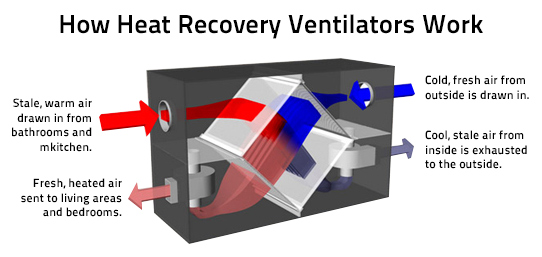How to Choose the Right HRV System for Your Property
Wiki Article
Discovering the Perks of Heat Recovery Ventilation for Power Effectiveness in Houses
Heat Recovery Ventilation (HRV) systems provide home owners a sensible technique to improving power efficiency. By reclaiming warmth from outgoing air, these systems can considerably minimize cooling and heating prices. Additionally, they offer a consistent supply of fresh air, boosting indoor air quality and convenience degrees. As home owners take into consideration sustainable alternatives, recognizing the nuances of HRV systems ends up being increasingly essential. What variables should one assess before making such an investment?Recognizing Heat Recovery Ventilation Solutions

Just How HRV Boosts Indoor Air High Quality

Energy Savings: The Monetary Benefits of HRV
Making best use of energy performance, heat recovery ventilation (HRV) systems use substantial financial benefits for homeowners. By recouping and recycling warm from exhaust air, HRVs noticeably lower home heating and air conditioning prices. This innovation can cause power financial savings of as much as 30%, depending on environment and usage patterns. Homeowners often see minimized energy expenses quickly after setup, making HRVs a monetarily wise financial investment over time. Furthermore, numerous areas offer motivations or discounts for energy-efficient upgrades, additionally improving the monetary charm. As energy prices proceed to climb, the cost-effectiveness of HRVs comes to be significantly clear. On the whole, the unification of HRV systems not just promotes energy effectiveness but also adds to long-term financial savings for homes.The Ecological Effect of Heat Recovery Ventilation
A considerable ecological advantage of heat more information recovery ventilation (HRV) systems hinges on their capacity to minimize overall energy usage. By recovering warmth from exhaust air and moving it to inbound fresh air, HRV systems lessen the requirement for energy-intensive home heating and cooling approaches. This reduction in energy need adds to decrease greenhouse gas discharges, as much less nonrenewable fuel source is needed to preserve comfortable interior temperature levels. Additionally, HRV systems enhance indoor air quality by efficiently exchanging stagnant air with fresh outdoor air, minimizing reliance on mechanical cooling systems that can hurt the atmosphere. Overall, the implementation of HRV systems supports sustainable living methods and straightens with worldwide initiatives to fight environment adjustment by promoting power performance in property setups.
Choosing the Right HRV System for Your Home
Exactly how can house owners guarantee they select the ideal heat recovery ventilation (HRV) system for their demands? They ought to examine their home's size and format, as these factors influence air movement needs. Next, evaluating the system's efficiency rankings is vital, as greater rankings show better efficiency and energy savings. House owners ought to additionally think about installment and upkeep costs, contrasting different brands and models for worth. Additionally, it is necessary to review sound degrees, as some systems operate more quietly than others. Consulting with HVAC professionals can provide tailored referrals based upon specific home problems. Checking out individual reviews and service warranties can aid in making a notified decision, making certain that the chosen HRV system successfully boosts indoor air top quality and power performance.Often Asked Questions

Exactly how Typically Should I Clean or Maintain My HRV System?
The frequency of cleansing or preserving a warmth recuperation ventilation (HRV) system normally depends upon use and ecological variables. Usually, it is recommended to execute upkeep every six months to guarantee peak efficiency and air top quality.
Can HRV Systems Help In Reducing Humidity Levels Inside?
HRV systems can efficiently minimize interior humidity degrees by exchanging stale, moist air with fresh, drier air from outdoors. HRV Heat Recovery Ventilation. This procedure aids preserve a balanced indoor atmosphere, improving convenience and protecting against moisture-related concerns
What Is the Life expectancy of a Regular HRV System?
The life expectancy of a regular heat recovery ventilation (HRV) system varies, generally lasting in between 10 to 15 years. Regular maintenance can expand its effectiveness and functional life, making sure peak performance throughout why not look here its usage duration.Exist Any Sound Worry About HRV Equipments?
Sound worry about HRV systems can emerge, specifically from fan operation. Several modern systems are made to minimize audio levels, guaranteeing they run quietly while preserving efficiency, which addresses prospective disturbances in living settings.Can I Install an HRV System Myself, or Do I Need a Specialist?
The private contemplated whether to set up the heat recovery ventilation (HRV) system personally or work with a specialist. Typically, while do it yourself installation is check that feasible, know-how guarantees appropriate functionality and conformity with neighborhood building ordinance, boosting system effectiveness.Report this wiki page